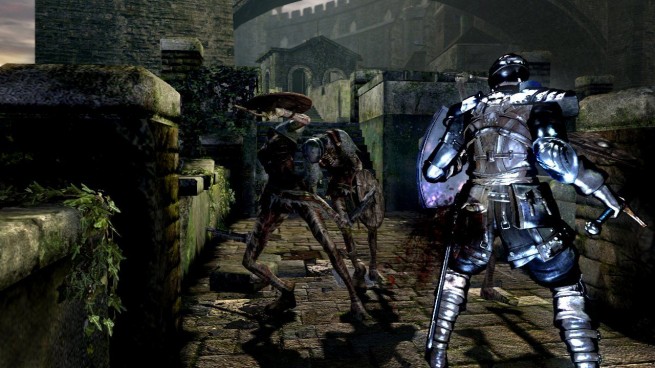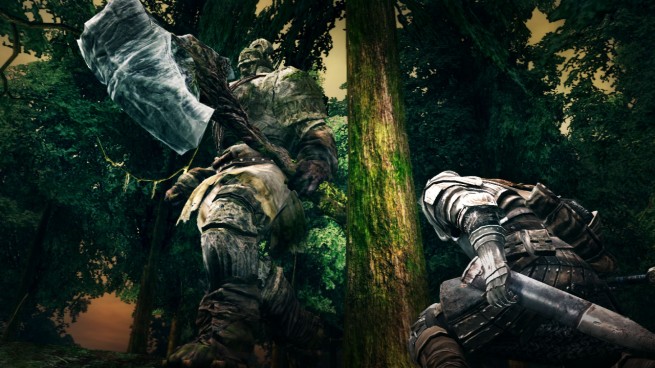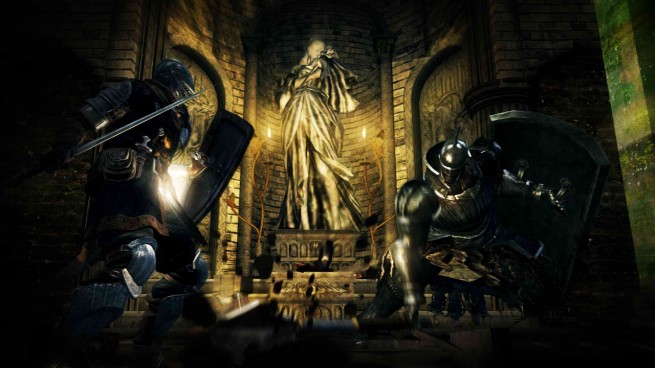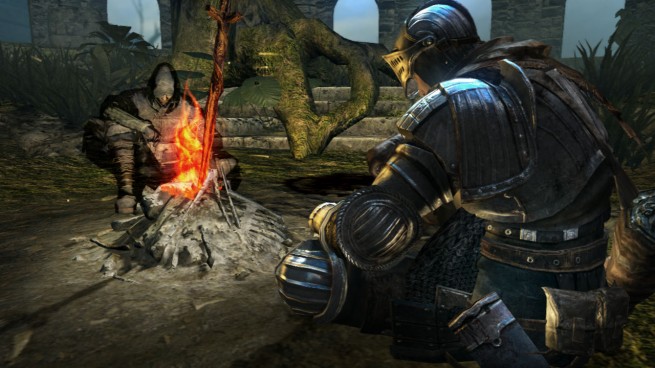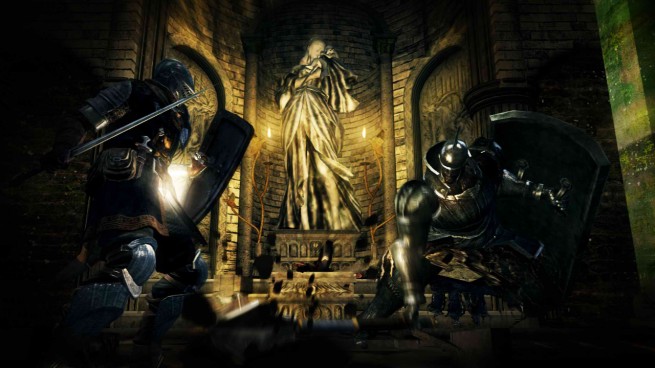Speedrunning video games, especially challenging ones, has been a time-honored tradition for hardcore players. Completing a game from start to finish as humanly possible usually requires not only conquering every aspect of the rules and mechanics but sometimes also bending them in ways the developer never expected or intended (Super Mario 64 speedruns are an excellent example of this).
GamesBeat spoke with Canadian gamer Fred “Thanatos” Vasquez — the 2011 Guinness World Record-holder for speeding through Demon’s Souls — about what it takes to compete at such a high level. Vasquez recently gained widespread acknowledgement for his Dark Souls run (video below), in which he completed the notoriously difficult action-RPG in less than a half an hour.
If you don’t know what Dark Souls is, this probably won’t mean a whole lot to you. …
GamesBeat: How long have you been in the speedrun scene? What attracted you to it?
Fred Vasquez: I became interested in speed running after a few years of watching other people perform speedruns of my favorite games. I was always left in awe of what they accomplished and always made me want to play the games again. I performed my first speedrun back in August 2010.
GamesBeat: Have you set speedrun records for any other games?
Vasquez: I currently hold the Demon’s Souls record at SDA [speeddemosarchive.com], first published on August 2010. Though it is still on the site, it has been obsoleted. That said, I’ve always been interested in reclaiming that record — I’m somewhat of a sore loser!
GamesBeat: Can you walk us through the preparation that goes into a speedrun — specifically, your Dark Souls run?
Vasquez: I’ve followed the same formula for both of my speed runs: Memorize the current speed run record’s path; attempt to imitate it, this is where most of the changes happen, the more I play I begin to spot mistakes or route improvements over the current record; once I’m comfortable running my improved path, run it indefinitely until I either a) get the record or b) am 1 second away from insanity.
People fail to realize that speed running isn’t as simple as merely ignoring enemies and running all the time. For a game like Dark Souls, you have to make sure how to deal with countless issues such as Stamina management, menu navigation — dropping/equipping items while on the menu screen while moving the character — knowing how to deal with all possible permutations of an enemy’s attack, et cetera.
GamesBeat: Starting from the beginning of the run, can you explain which character you chose and why?
Vasquez: The character I chose was the Bandit. The advantages of the Bandit are amazing early game damage and improved strength.
The reason I was interested in early game damage was because I knew that I would discard the starting weapon about seven minutes into the run, so picking up a weak starting weapon would prolong the time it would take to get to the new weapon.
The Bandit also offers one of the best starting shields in the game, since it has very high resistance to physical and more importantly to fire. as it can be used on Gwyn [Dark Souls’ final boss] if desired.
GamesBeat: You seemed to use the roll a lot to avoid taking damage, even from falling. Can you explain how that works?
Vasquez: In Dark Souls, whenever the player rolls, the player becomes immortal for a set period of time, roughly 0.6 or 0.7 seconds. During this time, no damage nor conditions will be applied to the player, making it a better way to avoid damage than even the greatest of shields, assuming good reflexes and timing are used when rolling.
The reason I rolled after falling from long distances was not to decrease damage, but to avoid getting in the “staggered” state, where the player will be on his knees for a period of time and slowly get up. During this time, no input is taken, and naturally, would cost me a few seconds each time. By rolling, you can bypass that state altogether, if performed correctly.
GamesBeat: What was some of the key equipment you needed throughout the run, and why?
Vasquez: First, the Drake Sword is an extremely overpowered early game weapon, which is why I made it a priority to get it as it allowed me to have a near perfect Gargoyles fight and a decent Queelag fight.
Secondly, the Lighting Spear is also a mandatory weapon to obtain, since it will completely demolish the Iron Golem in five mere hits. It would have taken me much longer with the Drake Sword or any other weapon I could find along the way.
Thirdly, the Crystal Halberd was the final weapon to obtain. This weapon offers insane damage and resin can also be applied to it to further enhance damage.
Lastly, I decided to pick up the black knight armor for the Gwyn fight, since it would allow me to take hits from him like a champ and hand pick the attacks that I wanted to parry.
Sadly, I figured out that the armor is not needed at all and can be skipped by fighting Gwyn in a different way, but this all came about after I did the run, so maybe I’ll use it next time!
GamesBeat: Can you explain why you dove to your death near Kingseeker Frampt and then manually restarted the game?
Vasquez: Essentially, I plunge to my death and await the loading screen; however, by quitting at the right time, you can decide what variables in the game get saved [overwritten] or not. The variable that I want saved is my location, x, y and z coordinate, and the variables that I don’t want overwritten are basically my health, and whether or not I have died.
When a game is loaded, the engine takes a look at the last position of the player, and based on that, will decide what map to load. Since my x, y and z coordinates belong to the Kiln rather than the map Frampt put me in, the game assumes I was in the Kiln, and therefore loads that map, and puts me in a default location.
GamesBeat: Ornstein and Smough gave you a bit of trouble. Why did you choose to defeat Smough first?
Vasquez: Ah … good ol’ O&S … I must admit that I begin to get nervous during this part of the run, since this fight is extremely reliant on good behavior from Ornstein and Smough. [The] reason I went for Smough first [was] because of the high lightning damage that a resin’d crystal halberd deals to him rather than Ornstein, making the first part of the run, and arguably the hardest, much shorter.
When I was performing the run, I was also streaming it for hundreds of people over at Twitch.tv, and I always had a little watch going that would tell me how I was doing. At this point in the run I was about 45 seconds ahead of my own record, which made me surprisingly nervous. I went back and looked at the fight, and I’ll be the first to tell you that it was garbage, pure garbage, but hey … even with such a horrible fight my time was still ahead of the record by minutes.
GamesBeat: You bested the final boss fairly easily with parries. Do you have any tips for players hoping to master that skill?
Vasquez: Generally, you want to press the parry button whenever the wind-up of the enemy’s attack animation has reached the middle point, not too early, but not too late, either.
GamesBeat: What tactics do you feel you could use to improve upon that battle?
Vasquez: I could have skipped the black knight armor and avoid getting hit by doing the following: Stand in front of Gwyn, without moving or attacking; wait for Gwyn to perform an attack and assume it is the fast swing; raise my shield in case it is the fast swing, in which case I will simply block it fully, since I would have the Spider shield, and parry the second attack. If it’s the slow swing, just parry it.
It is imperative to not raise your shield too early, since Gwyn’s A.I. knows whenever the player has its shield raised and will select other moves instead of the swings, such as the kick or grab.
This method is proven to work and will save 15 seconds by skipping the armor.
GamesBeat: Do you think your run can be improved upon? By doing what and how much time would be saved, roughly?
Vasquez: Yes it can, I have already improved the 32 minute, 47 second-record by performing a 29:27 run, and even that record can be improved to at least 28:xx by doing some newly found route changes and improvements.
When I performed the 29:27 record I changed the following things: I no longer leveled up health, but instead leveled stamina, for longer running, as well a dexterity for greater crystal halberd damage, roughly 150 more damage per swing. This means a much more risky route, since most hits from Queelag and O&S will kill me, but also a faster one. I no longer picked up the black knight armor for Gwyn. I fought him naked. Much better O&S fight — pretty much any fight can be better than the one I had in my 32:47 run, but with the greater damage from the halberd, they went down really fast. Picking up the Ring of Favor and Protection — this ring increases your health but most importantly increases stamina, which is much needed for longer running as well as more sword swings.
GamesBeat: Lastly, do you have any tips for players just making their way through Dark Souls, including all of the areas and optional bosses? What are the keys to dominating one of the hardest current generation games on the market?
Vasquez: Summon two people to help you out in your travels. The game becomes trivial if you get lucky and an experienced player joins you.
VentureBeat's mission is to be a digital town square for technical decision-makers to gain knowledge about transformative enterprise technology and transact. Learn More
